#"Mixtape hosting for artists"
Explore tagged Tumblr posts
Text
Boost Your Music Career: Helping Independent Artists to Get Noticed | @TopHotHits @DjSmokeMixtapes
As an independent artist, standing out in today’s crowded music scene can be tough. We’ve all been there, right? You’ve got talent, you’ve got drive, but sometimes it feels like your music just isn’t reaching the right people. So, how do you get noticed? The answer lies in effective music promotion—and I’m here to share a few key tools that can help you make a real impact. 1. Playlist…
#"Artist visibility"#"Artists"#"Boost your music career"#"Boost"#"Branding"#"Exposure"#"Fanbase"#"Fans"#"Get your music noticed"#"Get"#"Grow your music fanbase"#"Grow"#"Growth"#"Hosting"#"Increase music streams"#"Increase"#"Independent artists promotion"#"Indie artist tips"#"Mixtape hosting for artists"#"Mixtape promotion for indie artists"#"Music marketing strategies"#"Music promotion services"#"Music promotion strategies"#"Music promotion tools"#"MusicBusiness"#"Noticed"#"Placements"#"Playlist"#"PR"#"Promotion"
0 notes
Text
Boost Your Music Career: Essential Tips and Tools for Independent Artists to Get Noticed and Grow Your Fanbase
As an independent artist, standing out in today’s crowded music scene can be tough. We’ve all been there, right? You’ve got talent, you’ve got drive, but sometimes it feels like your music just isn’t reaching the right people. So, how do you get noticed? The answer lies in effective music promotion—and I’m here to share a few key tools that can help you make a real impact. 1. Playlist…
#"Artist"#"Artists"#"Boost"#"Career"#"Exposure"#"Fanbase"#"Fans"#"Get"#"Grow"#"Growth"#"Hosting"#"Increase"#"Independent"#"Indie"#"Marketing"#"Media"#"Mixtape"#"Music"#"MusicBusiness"#"Noticed"#"Placements"#"Playlist"#"PR"#"Promotion"#"Services"#"Social"#"Spotify"#"Strategies"#"Streams"#"Success"
1 note
·
View note
Text
Boost Your Music Career: Essential Tips and Tools for Independent Artists to Get Noticed and Grow Your Fanbase
As an independent artist, standing out in today’s crowded music scene can be tough. We’ve all been there, right? You’ve got talent, you’ve got drive, but sometimes it feels like your music just isn’t reaching the right people. So, how do you get noticed? The answer lies in effective music promotion—and I’m here to share a few key tools that can help you make a real impact. 1. Playlist…
#"Artist"#"Artists"#"Boost"#"Career"#"Exposure"#"Fanbase"#"Fans"#"Get"#"Grow"#"Growth"#"Hosting"#"Increase"#"Independent"#"Indie"#"Marketing"#"Media"#"Mixtape"#"Music"#"MusicBusiness"#"Noticed"#"Placements"#"Playlist"#"PR"#"Promotion"#"Services"#"Social"#"Spotify"#"Strategies"#"Streams"#"Success"
1 note
·
View note
Text
Boost Your Music Career: Essential Tips and Tools for Independent Artists to Get Noticed and Grow Your Fanbase
As an independent artist, standing out in today’s crowded music scene can be tough. We’ve all been there, right? You’ve got talent, you’ve got drive, but sometimes it feels like your music just isn’t reaching the right people. So, how do you get noticed? The answer lies in effective music promotion—and I’m here to share a few key tools that can help you make a real impact. 1. Playlist…
#"Artist"#"Artists"#"Boost"#"Career"#"Exposure"#"Fanbase"#"Fans"#"Get"#"Grow"#"Growth"#"Hosting"#"Increase"#"Independent"#"Indie"#"Marketing"#"Media"#"Mixtape"#"Music"#"MusicBusiness"#"Noticed"#"Placements"#"Playlist"#"PR"#"Promotion"#"Services"#"Social"#"Spotify"#"Strategies"#"Streams"#"Success"
1 note
·
View note
Text
Boost Your Music Career: Essential Tips and Tools for Independent Artists to Get Noticed and Grow Your Fanbase
As an independent artist, standing out in today’s crowded music scene can be tough. We’ve all been there, right? You’ve got talent, you’ve got drive, but sometimes it feels like your music just isn’t reaching the right people. So, how do you get noticed? The answer lies in effective music promotion—and I’m here to share a few key tools that can help you make a real impact. 1. Playlist…
#"Artist"#"Artists"#"Boost"#"Career"#"Exposure"#"Fanbase"#"Fans"#"Get"#"Grow"#"Growth"#"Hosting"#"Increase"#"Independent"#"Indie"#"Marketing"#"Media"#"Mixtape"#"Music"#"MusicBusiness"#"Noticed"#"Placements"#"Playlist"#"PR"#"Promotion"#"Services"#"Social"#"Spotify"#"Strategies"#"Streams"#"Success"
1 note
·
View note
Text
Boost Your Music Career: Essential Tips and Tools for Independent Artists to Get Noticed and Grow Your Fanbase
As an independent artist, standing out in today’s crowded music scene can be tough. We’ve all been there, right? You’ve got talent, you’ve got drive, but sometimes it feels like your music just isn’t reaching the right people. So, how do you get noticed? The answer lies in effective music promotion—and I’m here to share a few key tools that can help you make a real impact. 1. Playlist…
#"Artist"#"Artists"#"Boost"#"Career"#"Exposure"#"Fanbase"#"Fans"#"Get"#"Grow"#"Growth"#"Hosting"#"Increase"#"Independent"#"Indie"#"Marketing"#"Media"#"Mixtape"#"Music"#"MusicBusiness"#"Noticed"#"Placements"#"Playlist"#"PR"#"Promotion"#"Services"#"Social"#"Spotify"#"Strategies"#"Streams"#"Success"
1 note
·
View note
Text
Boost Your Music Career: Essential Tips and Tools for Independent Artists to Get Noticed and Grow Your Fanbase
As an independent artist, standing out in today’s crowded music scene can be tough. We’ve all been there, right? You’ve got talent, you’ve got drive, but sometimes it feels like your music just isn’t reaching the right people. So, how do you get noticed? The answer lies in effective music promotion—and I’m here to share a few key tools that can help you make a real impact. 1. Playlist…
#"Artist"#"Artists"#"Boost"#"Career"#"Exposure"#"Fanbase"#"Fans"#"Get"#"Grow"#"Growth"#"Hosting"#"Increase"#"Independent"#"Indie"#"Marketing"#"Media"#"Mixtape"#"Music"#"MusicBusiness"#"Noticed"#"Placements"#"Playlist"#"PR"#"Promotion"#"Services"#"Social"#"Spotify"#"Strategies"#"Streams"#"Success"
1 note
·
View note
Text
***BEST OF 2020: The Best Rap Albums From a Historically Horrible Year***

So much has been said about this year, so on the last day of 2020 I don’t need to dive any further into exploration of what made this year so challenging (both at a personal and global level), but on the bright side I will say that two unrelated forces saved this year for me: 1.) my amazing baby daughter, and 2.) the seemingly never ending cycle of new, interesting music releases.
Before we dive in, just two points on my criteria for this list:
- must be released within this calendar year (1/1 - 12/31/20)
- must consist of at least 7 tracks
- rankings are according to a combination of my own favorite albums, and other impressive pieces of work that might not be directly up my alley, but I still found truly impressive
So for my last post of 2020...here are the Top 100 Rap Albums/Projects of 2020 (and a more than worthy list of albums that belong on that same list, further down the page):
10. HOMME by Kipp Stone
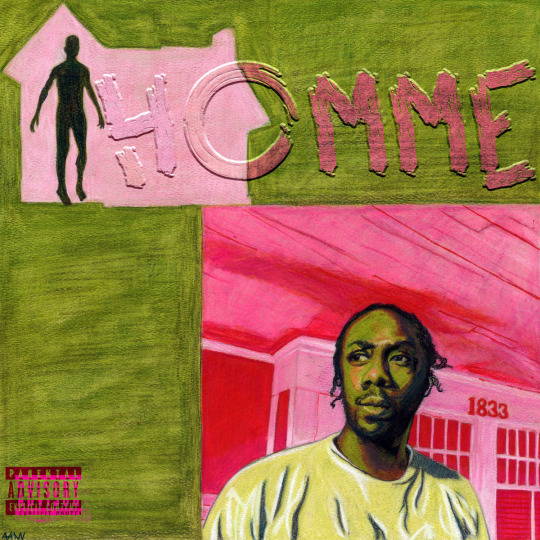
Without a doubt the most under-the-radar project on this list, and technically a mixtape and not an "album"...but that doesn't matter much to me, because this effort contains every bit of passion, every bit of perspective, and every bit of sheer love for rapping as any of the the best rap albums of 2020. It's hard to say whether East Cleveland is headed towards similar territory that Detroit, Buffalo, and Rochester now occupy, but with HOMME Kipp Stone captures the hunger, anxiety and forever shoulder-chipped struggle of having big dreams that seem more like unlikely fantasies. Kipp was buzzing a few years back, but making his grand return with this project is confirmation that he is next level talent and is more than ready to make a big splash in 2021.
9. Reasonable Drought by Stove God Cook$ and Roc Marciano
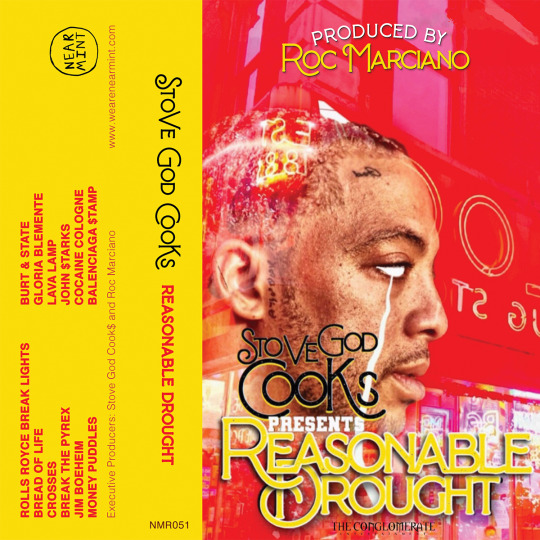
Quotes, on top of quotes, on top of quotes. Not sure what else to say about Roc Marciano's protege at this point, who came out of nowhere to close out 2020 as one of the most sought after feature-verse assassins in the business today. Yes, his bars are hilarious, but it's the outside-the-box references and unpredictable bar pairings that truly made this project such an impressive debut. Roc provided high quality instrumentals for Reasonable Drought, but it's clear that he was intentionally lurking in the background to allow the Stove God to stand on his own two. While the album is probably not at the level of Jigga's classic Reasonable Doubt debut that this project tips its' cap to, it's not hard to imagine that someday we will look back at Stove God Cook$' debut as the coming out party for one of New York City's finest MCs.
8. Àdá Irin by Navy Blue

I never imagined that one of the biggest challenges at this point would not be whether or not Navy Blue deserves to be recognized as having one of the top rap 10 albums of 2020, but rather which album to choose for the top 10!? From Earl Sweatshirt affiliate and Soundcloud producer to standout solo talent, the west coast born by east coast stationed MC/writer/producer/model/skateboarder (!?) had himself a banner year. Of his many gifts, his strongest is his ability to craft beautiful, soulful soundscapes that blend the best elements of the NYC lofi scene with shades of late 90's L.A. underground. Dealing with themes of love, loss, joy, and depression, Navy seems to possess wisdom well beyond his years, and it enabled him to craft not one, but two of the most inviting and accessible offerings from lofi circles that I have heard, and I mean that in the best way possible.
7. From King To A God (Deluxe) by Conway The Machine

He did it. Griselda's top muscle came through to deliver his most well-rounded, and arguably strongest overall project yet. Everything from the bars, to the varied production, to the bleeding soul of this project exemplifies the difference between an album and a "tape". The Machine was a machine in 2020, blitzing an astronomical number of feature verses, but FKTG was the gem he needed in his crown to solidify himself as a contender for best MC in the game moving forward. While this is not his actual Shady Records label debut (who knows when that will arrive now), this certainly feels like his major league arrival.
6. Alfredo by Freddie Gibbs and The Alchemist

Two hip-hop specialists getting together to drop a project just for fun in the middle of a pandemic...what could go wrong? Well, almost nothing, actually. Freddie arrived dripping with soul and Al slid a nice little package of beats his way, and what we ended up with was a strong partner-project to FETTI (their previous stellar collaboration alongside Curren$y), only packaged with little snippets of personal revelations and free-flowing opinions throughout. Gibbs is one of the masters of hooking you in with his voice and contagious flow, so much so that his skills as a talented writer are often overlooked. While not necessarily the incredible revelation that his collaborations with Madlib have been thus far, there's enough strong chemistry here between MC and producer to lock Alfredo down as easily one of the best rap projects of 2020. And the Grammy's would certainly agree.
5. Descendants of Cain by Ka

One of the genre's true master writers, Ka albums feel like audio literature placed over hard-nosed rap beats. Many rappers view themselves as true artists, but few can say they are capable of weaving the type of rhyme poetry that Ka seems to wield with casual ease. The truth is that it's not easy, we just aren't around to witness the care and editing that goes into Ka's work. Featuring too many stirring quotes to single out (and let us not forget an incredible surprise verse from fellow Metal Clergy-man, Roc Marcinao), Decendants of Cain is yet another impressive addition to Ka's catalogue, doing more to capture the paradoxical surroundings of environments that are equal parts harsh and loving - and often doing so through religious metaphors - than many MCs can do in a year. His lyrical paintings of the world may be bleak, but they are not without hope.
4. As God Intended by Che Noir & Apollo Brown

Apollo Brown has been one of the most revered - albeit not loudly proclaimed - underground hip-hop producers of the past decade. He has joined forces with many talented MCs to drop full partner projects, but perhaps none as under-the-radar as Buffalo's Che Noir. But what Che Noir lacked in household name status heading into 2020, she more than makes up for with conviction, writing ability, and the skills of an elite MC. The result of this collaboration is a beautiful, personal, at times painful, and at times just straight badass album, and one that deserves recognition from top rap circles. In my opinion, this is the greatest production work of Apollo Brown's career thus far, and it's hard to say where it will rank for Che Noir since she seems to be a fresh talent that is very much still on the rise - but as of right now, you have to call her one of the best in the biz today.
3. Pray for Paris by Westside Gunn

Westside Gunn is one of the masters of the volume game. That's not to say he - or anyone in camp Griselda - sacrifice quality over quantity, but it's safe to say that you know what you're gonna get with a Westside Gunn album. Welp, WSG rewrote the script with this one. What began as an art-inspired passion project between album releases ended up being the overall strongest Griselda project of 2020, and one of the year's most fascinating rap albums. Since his highly regarded Supreme Blientele album, Gunn has gradually been pulling his own lyrical content out of the spotlight, opting to play cook and curator, throwing a mixture of in-house producers and rappers in a pot with outside talent, to mirror the ambiance of a dark, gritty rap fashion show. His projects are less statements of content, than they are audio "scenes" that the listener is invited into, as if they’re Basquiat level exhibitions quantum-leaping forward in time to now live amongst a hungry, thriving rap scene in upstate New York. That's not to say that PFP isn't a lyrical feast as well, with everyone from Tyler, The Creator to Joey Bada$$ to Wale to professional dancer Cartier William having their turn in the spotlight. All thanks to Westside Gunn, the rare MC that enjoys being the host of his own party more than being the center of attention at one.
2. A Written Testimony by Jay Electronica (featuring JAY-Z)

While some are waving the Act II flag as Jay Electronica's "real" debut album, I am less interested in a cool collection of mostly-finished old songs, and much more interested in a polished, brilliantly produced project with (again, mostly) new verses from both Electronica and JAY-Z. It's easily the shortest selection on this list, but I feel like the quality of each individual song makes up for the brevity. I couldn't care less whether anyone thinks this is more of a duo-album or a solo piece, because the themes are certainly coming from Electronica's wheel house, and the fact that Hov was able to tweak his content to meet him there, is one of the things that makes AWT so special to me.
1. The Price of Tea in China (Deluxe) by Boldy James and The Alchemist
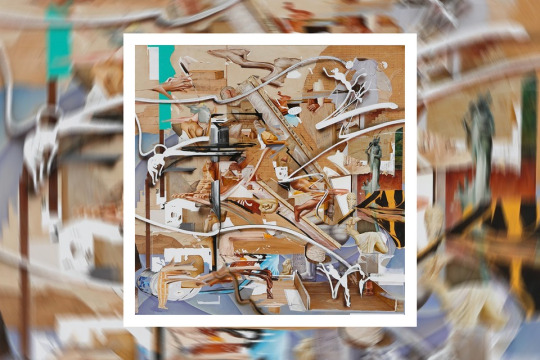
No, it doesn’t represent a seismic shift in the culture, and no it’s not *the album* that we heard blasting out of everyone’s (or anyone’s) car speakers this year, but when it came to sheer execution, and mastery over the style of music they were aiming to make, there just simply wasn’t one flaw in Boldy James and The Alchemist’s The Price of Tea in China. From the distinctly moody production, to the guest verses, to the steady hand of a wizened veteran of the street life, intent on sharing unfiltered tales of his underworld without any additional bells or whistles, it all clicks so well that I can’t picture taking the project out of my rotation. Uncle Al went deeeeeeep into his bag with this one, and Boldy seems to have returned from the industry grave to reach the highest level of recognition of his career. In a year stuffed with a plethora of high quality examples of every flavor of rap music imaginable, The Price of Tea in China is the ideal pick for album of the year, because it’s prestige is built upon it’s ability to simply be what it wanted to be without turning an ear to trends or reaching for broader recognition. TPOTIC’s broader recognition is made possible due to Boldy & Al’s artistic commitment to just making the type of music that a MC from Detroit and a legendary underground producer from Los Angeles love to make, and for that we should be very grateful.
Top 100 (all belong in the Top 25-50, but…there’s only 100 spots in the Top 100, so here we go):
11. FlySiifu by Fly Anakin & Pink Siifu
12. Song of Sage: Post Panic! by Navy Blue
13. Eastern Medicine, Western Illness by Preservation
14. Too Afraid To Dance EP by Chuck Strangers
15. Noise Kandy 4 by Rome Streetz
16. Mt. Marci by Roc Marciano
17. Burden of Proof by Benny The Butcher & Hit-Boy
18. Battle Scar Decorated by Monday Night & Henny L.O.
19. We Know the Truth (Deluxe) by Drakeo the Ruler
20. The Allegory by Royce Da 5′9″
21. Bag Talk by yungmorpheus & Pink Siifu
22. Innocent Country 2 by Quelle Chris
23. Weight of the World by MIKE
24. Kontraband by Rome Streetz & Farma Beats
25. BRASS by Moor Mother & billy woods
26. Try Again by ovrkast.
27. Shrines by Armand Hammer
28. The Smartest by Tee Grizzley
29. Good Energy by Grafh
30. Substance Abuse by Rigz & Futurewave
31. Cold Water by Medhane
32. King’s Disease by Nas & Hit-Boy
33. Milestones by Skyzoo
34. Young & Turnt 2 by 42 Dugg
35. My Turn by Lil Baby
36. Manger on McNichols by Boldy James and Sterling Toles
37. The OutRunners by Curren$y & Harry Fraud
38. Mach’s Hard Lemonade by Mach-Hommy
39. Sages by Henny L.O. & Ohbliv
40. E.L.E. (Extinction Level Event): The Final World Front by Busta Rhymes
41. Lake Water by SeKwence
42. At the End of the Day. by Fly Anakin
43. Sole Food by Deniro Farrar
44. The Oracle 3 by Grafh
45. The Blue Tape by Tree
46. lo&behold by lojii
47. Who Made The Sunshine by Westside Gunn
48. RTJ4 by Run The Jewels
49. Whitehouse Studio, Pt. 2 by Various Aritsts [Detroit]
50. Carpe Noctem by Big Ghost Ltd
51. Infinite Wisdom by Lord Jah-Monte Ogbon
52. The Throwaways by The Opioid Era
53. Anyways by Young Nudy
54. PTSD (Deluxe) by G Herbo
55. Holly Favored by Monday Night & Foisey
56. THE GOAT by Polo G
57. Dump YOD: Krutoy Edition by Your Old Droog
58. The Face of Jason by ANKHLEJOHN
59. Two4one by Jay Worthy
60. Poetic Substance by RIM & Vinyl Villain
61. ve·loc·i·ty by H31R (Maassai & JWords)
62. UNLOCKED by Denzel Curry & Kenny Beats
63. Slim E and Friends by CHASETHEMONEY
64. Alone Time by YL
65. FLYGOD Is An Awesome God 2 by Westside Gunn
66. OBLIVION by Black Noi$e
67. Sleeper Effect by Sleep Sinatra
68. Savage Mode 2 by 21 Savage & Metro Boomin
69. Thug Tear by Big Kashuna O.G. & Monday Night
70. II - The Next Wave by Quakers
71. Demon & Mufasa by Yhung T.O. & DaBoii
72. Eternal Atake by Lil Uzi Vert
73. Miles by Blu & Exile
74. IMMORTALKOMBAT by Al Divino & Estee Nack
75. The Baltimore Housing Project by Jay Royale
76. I’m Still Perfect by Baby Smoove
77. The Grotesque & Beautiful by Teller Bank$
78. Crime Scenes by Ransom & Nicholas Craven
79. Streams Of Thought, Vol. 3. by Black Thought
80. Ways and Means by Rasheed Chappell & 38 Spesh
89. Sacred Psalms by El Camino & 38 Spesh
90. As Above So Below by ANKHLEJOHN
91. Tomorrow Is Forgotten by Stik Figa & Conductor Williams
92. So Help Me God! by 2 Chainz
93. Sauce Monk Volume 3 by Sauce Heist & Camoflauge Monk
94. A Beautiful Drug by WTM Scoob
95. Don’t Play It Straight by Small Bills (ELUCID & The Lasso)
96. No More Humble Fashion by Flee Lord
97. Pharaoh Chain by Planet Asia & Tha Musalini
98. Numb by Sha Hef
99. Interstate 38 by 38 Spesh
100. Get Money Teach Babies by Heist Life & Spanish Ran
THE REST OF THE BEST (all belong in the Top 100 releases of 2020, blame 2020 for being such a stacked year for music) - in no particular order:
Assata by CV$ a.k.a. Con$piracy & Teller Bank$, Spencer for HIGHER 3 by Vic Spencer & sonnyjim, Big Bad Boldy by Boldy James & Real Bad Man, Da 5th Power by Mooch, Muthaland by BbyMutha, Act II: Patents of Nobility (The Turn) by Jay Electronica, Long Story Short by Heem, Eileen by 14 Trapdoors, Free Drakeo by Drakeo the Ruler, Da Fixtape by Da Cloth, The L.I.B.R.A. by T.I., Sinners & Saints by Rasheed Chappell & Buckwild, Black Schemata by yungmorpheus............... Polly by the Powder Keg by Chuck Chan & Pad Scientist, High Off Life by Future, Memphis Massacre 2 by Duke Deuce, LSD by The Leonard Simpson Duo & Guilty Simpson, Funeral by Lil Wayne............ RAW UNKNOWN by Spectacular Diagnostics, Nezzie’s Star by Eddie Kaine, ShrapKnel (self-titled), The Bluest Note by Skyzoo & Dumbo Station, WUNNA by Gunna, Meet The Woo 2 by Pop Smoke, Fresh Air by UFO Fev & Statik Selektah, Vito by Vince Ash, Avenues by Tony Seltzer & Adrian Lau, Spilligion by Spillage Village, GRIMM & EViL by GRiMM Doza, Closer Than They Appear by Lyric Jones, RUDEBWOY by CJ Fly, Wired Different by Ty Farris & Bozack Morris, Rocket to Nebula by Killah Priest, NO Blade of Grass by V Don, I’m My Brother’s Keeper by Yella Beezy & Trapboy Freddy................. Carhartt Champions by Tree Mason, No Hook 3 by Dunbar, Rowhouse Whispers by Ray West & Zilla Rocca, Magneto Was Right #4 by Raz Fresco, DUMP LIFE by Tha God Fahim, Jay NiCE & Left Lane Didon, FNTG: From Niggaz to Godz by Squeegie O, PANAGNL4E, Vol. 2 by Los and Nutty, Thank You For Using GTL by Drakeo & JoogSzn, Adjust to the Game by Larry June, BETTER by Deante’ Hitchcock, No Cosign Just Cocaine 3 by Ty Farris, Vangarde by Mr. Lif & Stu Bangas, MSYKM by Tsu Surf, Your Birthday’s Cancelled by Iron Wigs.................. LULU by Conway & The Alchemist, No One Mourns The Wicked by Conway & Big Ghost, Talk Soon by Nolan The Ninja, FULL CIRCLE by Medhane, Detroit 2 by Big Sean, Juno by Che Noir & 38 Spesh, Send Them To Coventry by Pa Salieu............... Marlowe 2 by Marlowe (L’Orange & Solemn Brigham), The Versace Tape by Boldy James & Jay Versace, The Balancing Act by Statik Selektah, Capital Gains by Willie The Kid, Deutsche Marks 2 by Willie The Kid & V Don, Keep Going by Larry June & Harry Fraud, The Sharecropper’s Daughter by Sa-Roc, Seven Times Down Eight Times Up by Elzhi & JR Swiftz.................... The Ghost of Fritz by Jamal Gasol, Don’t Feed the Monster by Homeboy Sandman & Quelle Chris, Anime, Trauma and Divorce by Open Mike Eagle, Brentwood by Poloboy Nunu, The Listening Session by Billy Danze & TooBusy, Midnight Sons by Zilla Rocca & Chong Wizard, A Piece of Mine by Bub Rock, The Rock Period by Bub Rock, WINTER by DJ Muggs, Bartier Bounty 2 by Sada Baby, Cincorginals by Tobe Nwigwe, Director’s Cut (Scene Three) by Ransom & Nicholas Craven, Rather Be A Real One by Vic Spencer.............. Exhibit Q by Deniro Farrar, After 12 by Che Noir, Blank Checc by Baby Money, Jesus Is My Homeboy by YL, The People’s Champ by Flee Lord, In The Name of Prodigy by Flee Lord & Havoc, Culture Over Corporate by Uptown X.O., Sell Sole 2 by Dej Loaf, Progress by Struggle Mike, Merry Wickmas by Shawny Binladen, Don’t Ask Me Where I’m From by Donsmith, Serene by VRN Hayes, In My Life by Dat Boi Vic, Ho, Why Is You Here? by Flo Milli, Limbo by Aminé........................................thank you, and cheers to a happier, healthier New Year. 🙏
#BestOf2020#COVID#BLM#children of men#underground hip-hop#Happy New Year#NYE#2021#Apollo Brown#Che Noir#jay-z#Jay Electronica#Conway#westside gunn#alchemist#Freddie Gibbs#boldy james#Kipp Stone#Ka#descendants of cain#the price of tea in china#Alfredo#aWt#A Written Testimony#reasonable drought#stove god cooks#Roc Marciano#as god intended#Pray for paris#navy blue
11 notes
·
View notes
Text
Music pub sonos

#Music pub sonos archive
#Music pub sonos full
#Music pub sonos archive
New Artist Radio Hours this month with Xenia Rubinos, The Weather Station and more will air on Sonos Radio and be available on-demand via the Sonos Sound System Archive on Mixcloud.
The first episode will air March 8 and features Dawn Richard. Upcoming guests include Jamila Woods, Julien Baker, Merrill Garbus (tUnE-yArDs), Neko Case and more. Focused on amplifying women’s voices in song and conversation, the new biweekly show on Sonos Sound System will focus on woman-driven music and present a mix of newcomers and familiar names for in-depth conversations and to give a look behind the curtain what it’s like to be a woman in the industry helping drive music culture.
Sheroes Mixtape Memoir is a new bi-weekly show created and hosted by Sheroes Radio host/producer, Carmel Holt.
The first episode airs on International Women’s Day, March 8 and will feature mastering engineer Heba Kadry whose clients include Slowdive, Björk, Julianna Barwick and soundtrack work for films such as Midsommar. Upcoming guests on Women in Sound include Yaeji, SASAMI, Dana Wachs and more.
Based on the popular zine, the show will feature guest interviews as well as music guests have been involved with.
Women in Sound is a new bi-weekly show on Break the Ceiling that focuses on women and non-binary professionals working in live and recorded sound.
Find a quote from the group on curating Break the Ceiling below. The station focuses on music created by and driven by women, spans genres and decades and is a thrillingly diverse listen.
Break The Ceiling a new station entirely curated by the a grassroots employee group for self-identifying women at the company.
Sonos Sound System, Sonos Radio’s signature ad-free station, is launching new shows and content including: As always, all episodes will be available to listen to anytime and anywhere following their debut on Sonos Radio via the Sonos Sound System Archive on Mixcloud and via the Sonos app.Īdding to its growing catalogue of thoughtful programming, Sonos Radio continues to empower listeners to discover new music through human curation, going beyond algorithmic playlists for inspiration. With this content, Sonos Radio will bring listeners the stories, inspirations, songs and careers of strong and inspiring women, women-identifying and non-binary professionals in music like Arlo Parks, Yaeji, Julien Baker, Jamilla Woods, Xenia Rubinos, Heba Kadry, The Weather Station, Neko Case and so many more. Both shows will release new episodes bi-weekly. Coming March 8, on International Women’s Day, are two new shows, Women in Sound, on the Break the Celling Station which focuses on women and non-binary professionals working in live and recorded sound, and on Sonos Sound System, Sheroes Mixtape Memoir from Sheroes Radio’s Carmel Holt that focuses on giving a peek behind the curtain of working in the industry. Now live, Break The Ceiling is a new station curated entirely by women and women-identifying employees inside Sonos. 8-point life in brand preference.Today, Sonos is excited to share new programming coming to Sonos Radio in celebration of Women’s History Month, all hand-curated and hosted by inspiring women and women-identifying artists, creators and professionals. Results: 19x return on a spend during the promotion period.
#Music pub sonos full
By rolling these campaigns out sequentially, we encouraged people to think about their full homes sound system offering. We later followed the PLAYBASE launch with a promotion featuring home theater companion components the Play1 and SUB in paid social using dynamic ads. This was an integrated campaign across all advertising mediums. An incredible, all in one, full sound home theater system that sits beautifully under your TV, giving you incredible sound that is simple and wirelessly expandable to 5.1. The PLAYBASE was developed on the simple insight that up to 70% of all TVs stand on furniture and are not mounted to the wall, PLAYBASE was designed to accommodate the way people live at home. For help with your system, please visit the Sonos support center. 10+ potential sales increase Read how businesses like yours used Soundtrack to blow past targets. Listen to what you want, where you want, how you want on Sonos. 58 million songs licensed for bars The most music for the best playlists. An iPhone, iPad, or iPod touch: On your device’s Home screen, tap Settings, tap Music, then tap to turn on Sync Library. Play them any way you want, only with Soundtrack. Another computer: In the Music app on your Mac, sign in to the iTunes Store using the same Apple ID that you used on the first computer, then choose Music > Preferences, click General, then select the Sync Library checkbox. This campaign marks the launch of PLAYBASE, the newest speaker in the home cinema line-up. A better music streaming service for bars and pubs The most songs, playlists, and stars. Role: AMPAC Campaign & Integrated Media Lead

0 notes
Text
Tee Grizzley Is Getting Big Bucks From Gaming
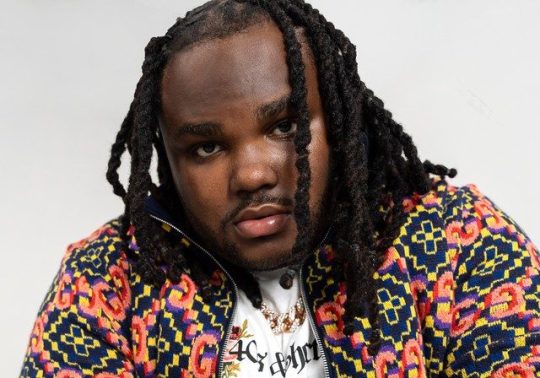
Tee Grizzley has been making headlines lately for his private Grand Theft Auto Online server. Grizzley Gang Gaming is receiving a surge in attention but has been on a consistent rise since it's launch. The rapper's private server is called is a virtual hub where players engage in Grand Theft Auto Role Play. The Detroit-based artist has hosted several major streamers in gaming; as well as fellow rappers. The streams are a semi-scripted storyline format that simulates life in the trenches without the risk. “I created a Grand Theft Auto server called Grizzley World. It represents the trenches. (Grizzley World) let's you be in the streets without being in the streets" stated Grizzley in a recent interview. The Official Grizzley Gang YouTube page is just under 500,000 subscribers and recently signed a lucrative deal with lifestyle gaming brand XSET in April. https://youtu.be/Fra7FPOBdwA Grizzley Gang Joins XSET In April 2022, Tee Grizzley signed a deal with premiere lifestlye gaming brand XSET. XSET is an organization that specializes in providing a second chance for ex-convicts through online gaming. PR Newswire Quote From XSET CBDO and co-founder Clinton Sparks: "XSET is about pushing boundaries and redefining the world of gaming. We are excited to welcome Tee Grizzley to the set to help give a second chance to those who need one, as well as continuing to introduce gaming to those unfamiliar with the opportunities it provides. XSET is building the worlds greatest culture club and Tee with his music, gaming and entrepreneurial spirit is an amazing representation of what that means." The partnership will allow Tee Grizzley to expand the subscription-based Grizzley World to the next level. "I'm excited to join XSET and take Grizzley Gang Gaming to the next level. I've always loved gaming for fun, but now it's so much more than that. I've seen how this industry can really change lives and I can't wait to provide more opportunities for people who have faced similar challenges and adversities as I have", stated Grizzley according to PR Newswire. Million Dollaz Worth Of Game Podcast Interview https://youtu.be/QyiBHASDW24 During a recent interview with Wallo and Gillie The Kid, the "First Day Out" creator elaborated on thelucrative business of video game streaming and how he monetized his platform: “I get paid from the server because it's membership-based and we have nearly 90,000 members. I stream it on Twitch and get paid from them. Then I take the Twitch videos I streamed and put them on YouTubeto get paid on there too. Plus, there are sponsorships, ads, and all this s**t (to) get paid from too”, Tee told the hosts. Additionally, he revealed that other members on the Grizzley World server get paid for playing also. This is a major step for diversifying the landscape of video game streaming. Video game streaming and hip hop may seem like an odd pairing, but this isn't a new trend. Pro gamer Ninja has played Fortnite with Drake, which Drizzy used as promo for "God's Plan". Meanwhile, polarizing streamer Adin Ross has hosted Polo G, Blueface, Lil Yachty and many more. Hip Hop's influence continues to innovate across mediums. Malcolm “Laidback Mack” Morrow | IG: @mack_stay_manifesting | FB: The Hood Hippie MS | Twitter: @_laidbackmack_ Related Articles: Half Tee, Half Beast Mixtape: https://fmhiphop.com/tee-grizzley-releases-new-mixtape-half-tee-half-beast/ Guapdad4000 Short Film On Amazon Prime: https://fmhiphop.com/guap-stars-in-short-film-stoop-kid/ Read the full article
0 notes
Text
WHAT'S BEEF: Jay Electronica’s Album ‘A Written Testimony’ Has Joe Budden & Peter Rosenburg Feeling A Certain Type Of Way
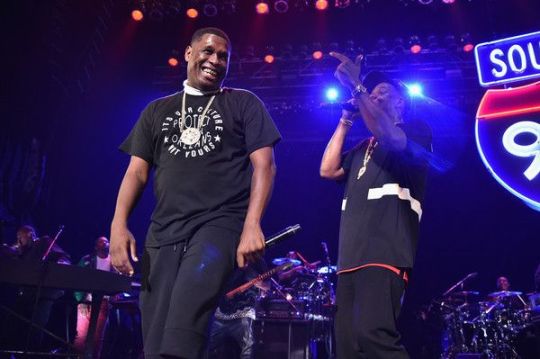
Jay Electronica finally released his debut album, A Written Testimony, and it has ruffled some feathers. More inside…
Jay Electronica made a splash on the Hip Hop scene over a decade ago and he’s just now releasing his debut album…finally.
In 2007, he captured the ears of Hip Hop fans with Act I: Eternal Sunshine (The Pledge), which featured him rapping over the score for the film Eternal Sunshine of the Spotless Mind. An album was promised but it was never delivered…until now. And he’s causing a scene with a few Hip Hop heads.
After signing to Jay-Z’s Roc Nation in 2010, the New Orleans native released his debut album, A Written Testimony – with a guest feature from Jay-Z who raps on almost every track - last week. Rapper-turned-content creator Joe Budden’s recent podcast episode was dedicated to criticizing Electronica’s first studio album. You can listen below:
youtube
The podcast hosts kept reiterating that the album wasn’t a Jay Electronica album since Hov spits on almost every track. They also didn't like that Hov was the first person you heard on Electronica's debut album.
A fan tweeted Joe had no room to criticize Electronica’s album based off the success of his own rap career:
Joe Budden hasn’t dropped a classic in his life and he’s critiquing Jay Electronica and Hov? pic.twitter.com/8whpkW3c4u
— 4EverShook (@4Evashook) March 14, 2020
Electronica - who shares a daughter with Erykah Badu - got wind of their critique and responded to Joe’s co-host Rory and then Joe popped back:
"I never got absolutely mopped around on my own project either ... @ me, not Rory," Joe tweeted.
"I never heard your albums bro. May Allah bless your career as a journalist," Electronica responded.
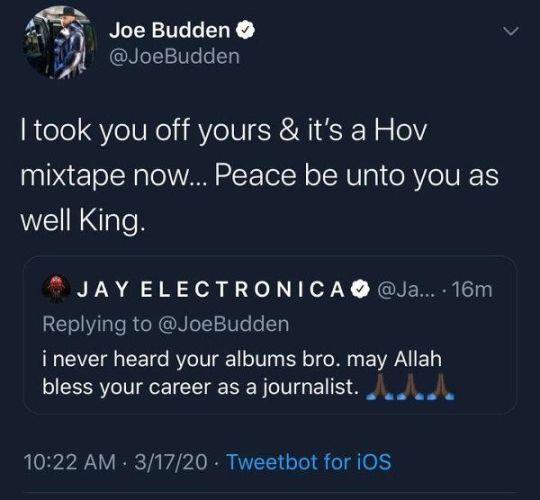
"I took you off yours & it's a Hov mixtape now... Peace be unto you as well King," Joe responded.
Electronica kept with the trolling, posting:
make sure yall give me my credit for lighting up that next podcast episode too. #DrakeIsMySpiritAnimal
— J A Y E L E C T R O N I C A (@JayElectronica) March 17, 2020
"Make sure yall give me my credit for lighting up that next podcast episode too. #DrakeIsMySpiritAnimal," he tweeted.
Electronica's album also ruffled the feathers of HOT 97 radio host Peter Rosenberg. A Written Testimony makes a lot of references about race and religion and one lyric caused Rosenberg - who is Jewish - to respond because he feels like the lyric is anti-Semitic. Electronica - who is a devout Muslim - raps:
“And I bet you a Rothschild I get a bang for my dollar/the synagogue of Satan want me to hang by my collar"
"My feet might fail me, my heart might ail me The synagogues of Satan might accuse or jail me"
Not feeling this bar from Jay Electronica and I know I'm not the only person who felt a way about it .
— Peter Rosenberg (@Rosenbergradio) March 14, 2020
As a Jew it puts me in a bad position. I can ignore the fact that I instantly felt a pang of discomfort and offense and basically sell out my culture or I can be accused of being the "Jewish media" hating on this man. But it's how I felt. The line offended me.
— Peter Rosenberg (@Rosenbergradio) March 14, 2020
It has been so long since hip hop has done that to me. It used to be commonplace for songs to have lines that were iffy and made me feel like "damn does this artist hate Jews?" Not in a minute. So thanks for throwing it back Jay.
— Peter Rosenberg (@Rosenbergradio) March 14, 2020
Peter then realized he was reacting to lyrics from a different song:
Apologies I quoted the wrong song ... when I googled "Synagogue of Satan" -- I mistakenly assumed Jay only said it once... this is the second time ... the line this time is "The synagogue of Satan want me to hang by my collar" . lol my bad..songs dope besides that cringe though
— Peter Rosenberg (@Rosenbergradio) March 14, 2020
"Apologies I quoted the wrong song ... when I googled 'Synagogue of Satan' -- I mistakenly assumed Jay only said it once... this is the second time ... the line this time is 'The synagogue of Satan want me to hang by my collar' . lol my bad..songs dope besides that cringe though," he tweeted.
Electronica responded with a subliminal jab:
clout chasing us at an all time high.
— J A Y E L E C T R O N I C A (@JayElectronica) March 15, 2020
Then, he addressed Rosenberg directly:
and btw, @Rosenbergradio if you REALLY wanna get into it, we are willing to hold a discussion in a PUBLIC FORUM on The Synagogue of Satan and it’s meaning with any Scholars of Theology you would like to bring. until then. STFU
— J A Y E L E C T R O N I C A (@JayElectronica) March 15, 2020
"and btw, @Rosenbergradio if you REALLY wanna get into it, we are willing to hold a discussion in a PUBLIC FORUM on The Synagogue of Satan and it’s meaning with any Scholars of Theology you would like to bring. until then. STFU," Electronica tweeted.
The HOT 97 radio host said he's eager to talk it out on a public forum:
I have a public forum everyday if you ever want to talk -- feel free ...
I am not the only good, supportive, hip hop loving person who was taken aback by some of these bars...happy to discuss it any time ..
— Peter Rosenberg (@Rosenbergradio) March 15, 2020
"I have a public forum everyday if you ever want to talk -- feel free ... I am not the only good, supportive, hip hop loving person who was taken aback by some of these bars...happy to discuss it any time ..," he responded.
When the radio host went on the air on Monday, he addressed his Twitter exchange with Electronica:
This exchange didn't sit well with Rosenberg. He decided to take time away from Monday's installment of Ebro in the Morning to address Electronica's "aggressive response."
"It's no person's job from another group to tell another group when they should be offended," Rosenberg said around the clip's three-minute mark. "In the climate that we're in now, I found it dangerous and hurtful just as a Jewish hip-hop head. People wanted to come for me and villainize me for having feelings about my own group. ... This is just my opinion about words that offended me."
He continued "You can only have your group associated with Satan so many times before you're like 'What's going on?'" Rosenberg continued. "And I think I have that right."
Check it:
youtube
Complex delves deeper in the meaning behind the lyric and more:
Electronica purposely makes his lyrics difficult to decipher. Yet, when the Synagogues of Satan are mentioned in biblical texts, it refers to a group of Jewish people who use their religion as a front. These people hide behind Judaism to help them persecute other chosen people.
In 2012, Jewish bank heiress, Kate Rothschild, left her husband to pursue a relationship with Jay Electronica. Electronica was ripped by the British tabloids for his connection with Rothschild. This sensationalized media attack heightened after their relationship ended, with claims that Electronica was violent toward Rothschild.
On A Written Testimony's "Ghost of Soulja Slim," Electronica reference to the Synagogue of Satan is paired with wordplay aimed at his ex-girlfriend.
"I came to bang with the scholars," he raps. "And I bet you a Rothschild I get a bang for my dollar/The synagogue of Satan want me to hang by my collar/But all praise due to Allah Subhanahu wa ta'ala."
This creates the allusion that Electronica was not attacking the Jewish religion or even multiple Jews. Instead, he was finding a clever way to vent about a personal vendetta he had against a woman who he feels aided in helping the media assassinate his character. Still, Rosenberg feels like this attack created a careless ricochet that hurt other Jewish people.
Do you think Rosenberg has a legitmate reason to feel a way or do you think he took a lyric personal that wasn't meant for him? Let us know your thoughts!
Photo: Getty
[Read More ...] source http://theybf.com/2020/03/17/jay-electronica%E2%80%99s-album-%E2%80%98a-written-testimony%E2%80%99-has-joe-budden-peter-rosenburg-feeling-a-ce
0 notes
Text
How Kim Namjoon ISNT as problematic as he was before and how he is growing/owning up to his past actions
(dick sclaimer, I am not and NEVER defending his actions in the past, they are not excusable and I am very sorry if I am offending you)
*at the end of the day I’m not forcing you to accept or support Namjoon, if you don’t want to.... I guess “fuck” with him because of his actions in the past thats totally okay
*also dont feel as if I am biased towards him I’m trying to write this with a open mind, I won’t baby him and be like My POOR BABY AND WENT THRU SO MUCH BLAHDUFU
So lets start off with what Namjoon did for him to be called problematic:
“Talking black as a talent”
Saying the n-word during Shinhwa’s cover (k but why did no one beef shinhwa tho?)
RM said: “When I first saw V and J-Hope, I couldn’t see them because they were too black.. Yeah when the nights get too dark I couldn’t find them.” (this was in English
Just cultural appropriation of black culture, like having dreads (many of my black friends referred to him as a blackboo
Also I don’t personally like the term “trying to act black” but my black friends said he was basically “a wannabe hoodman”.
His background
Overall I feel as if Namjoon had a little phase where he really was lost in identity (i talk about this more don’t attack me). Like I’m not saying LOL HE WAS HAVING A KPOP PHASE, but as he mentions further on in post he had a really closed minded view on hip hop.That rapping only had one style, one culture, one way to act and speak. When Namjoon first started rapping he had the whole dreadlocks thing going on, kind of showing that he believed you had to black in order to rap, overall he was receiving and interpretating a close minded view on hip hop. I definitely don’t think Namjoon has hateful thoughts against black people. But you can still NOT be racist and culturally appropriate. He was just being oblivious and ignorant that his actions are offensive (I explain this more).
How he learned from his mistakes (so basically the proof section of my rant)
*Acknowledging he had a close minded view on hip hop
Namjoon admits his mistakes, in his mixtape interview: in 2015
Q: You shouted, “Westside Till I Die” during ‘If I Ruled The World’.
RM: That’s well… I was really wrong then (laughter). After the album came out and I listened to it, I thought “Ah”. I think I was immersed in the emotions while recording and ended up shouting like that.
Q: What’s the specific reason why you feel you were wrong?
RM: First off, I didn’t even live in the 'west side’… And even if that song had a G-Funk sound, what I shouted wasn’t the way to respect the west coast hip-hop musicians. I believe there are many meanings inside the words “Westside Till I Die”. Sweat, struggles, pride, etc. Isn’t it a phrase that compressed all these factors of life.
Q: Are you saying that you overlooked the weight and complex undertones that the phrase has within hip-hop?
RM: That’s right. I believe it’s different from words like “Yo!” or “Check It!”. As a result, I was thoughtless.
Q: Are you admitting it to be a mistake?
RM: Further than a mistake, it was a wrong. I have nothing to say.
*honestly this part is really self explanatory. This interview was in 2015 while the song was in 2013. So he was basically justified how in the beginning of his career he was ignorant and oblivious to the real meaning of hip hop. You can definitely see his music grow for the better after this.
*Why I M Y S E L F personally forgave him for this action.
I feel as if this quote doesn't only signify him saying “west side” when he’s not from the west side, but him acknowledging his mistakes of having a close minded view hip hop IN G E N E R AL and being ignorant of “what hip hop is”. He definitely owned up to his actions “ Further than a mistake, it was a wrong.”
He acknowledges them and admitted to them “ First off, I didn’t even live in the 'west side “
and never repeated them ever since. His music now definitely doesn't fit the stereotype of rapping nowadays. Might I suggest watching politically woke MV “CHANGE” he did with black rapper WALE.
Respecting black culture or hip hop’s origins (THIS IS PROBABLY ONE OF HIS MOST OPEN MINDED MOMENTS THIS IS ONE OF THE BIGGEST REASONS I FORGAVE HIM)
I’ve seen many people think Namjoon mocks black culture but this interview really opened up my eyes to many things and how we can learn from our mistakes
In this interview he did in 2015 >> you can really see how compared to the last interview, he seems more confident with what he is saying, he has no hesitation, and CLEARLY states what he feels about hip hop and black culture.
“There are two things that Warren G told me that I will never be able to forget. The first is, hip-hop is open to any one. Despite what your race is or where you’re from, hip-hop is a type of music that is always ready to give you space for anyone who enjoys hip-hop. So, don’t restrain yourself behind any type of prejudiced thought, and the other one was you’re doing well, so no matter what others say, believe in yourself and do what you want.”
This connects to what I mentioned before of Namjoon having a close minded view on hip hop before and thinking hip hop was associated to one certain race. Now he fully understands that hip hop is for everyone.
“Defining hip-hop is the same as trying to define love. If there are 6 billion people in the world, then there are 6 billion definitions of love, and like that, each definition of hip-hop is different for each person. Of course, it’s possible to give a dictionary definition. In 1970, there was a person called DJ Herc in South Bronx. At a party that he was hosting, he set breaks on a beat and during that break, someone would be rapping, someone would be dancing, and someone else would be doing graffiti… That’s how hip-hop was born, and they call that the 4 elements of hip-hop, but dictionary definitions like these is something anyone knows, but to explain that spirit… In one word, it’s something that can’t be explained. It’s a way that expresses me as well as being a meaning for freedom and rebelling. Because it’s something where people play and have fun with, it can have messages of peace and love placed in it. If you compare it to a Pokemon, it’s like a Ditto. Personally, hip-hop to me is the world. The world that I’m living in… It’s difficult, right? To be honest, it’s still hard for me too.”
He is now owning up to his actions by making his own music about his own life. His own hip hop.
“The culture of shooting guns and doing drugs is not the actual self of hip-hop. It’s just become a by-product that appeared around hip-hop music, it’s not the actual self of hip-hop. Although there’s a certain image that pops up clearly when you think of hip-hop fashion, that’s also becoming something that’s more broad. Look at A$AP Rocky or Kanye West. They don’t wear pants that drag around any more. To understand ‘swag’, you need to understand what kind of meaning ‘making it on your own’ has in hip-hop. Making it on your own is a very cool and important concept in hip-hop. I’ll use Jay-Z as an example. Jay-Z was a drug dealer. He’s someone that sold drugs on the rooftop of a very large stadium called Barclays Center, but he succeeded and bought that building. After buying that building, he dressed up in hip-hop and then went up to the rooftop and looked down at that building. Then they took a picture of that and posted it. After seeing that, everyone died. Kya… Just how cool is that?”
Namjoon acknowledges that there are many stereotypes associated with hip hop and also a “culture” to it. But he should try to do his own thing and not generalize.
Namjoon’s personal apologies
Personally I noticed especially for bighit, when it comes to western fans that seem to have a problem with what BTS is doing they never allow their idols to apologize. I’ve seen Namjoon apologizing facing korean fan based controversies.
The two interviews were already big indicators of how Namjoon grew from a close minded hip hop enthusiast to his own rapper and artist, but I found one v live where he personally talked about his actions as a general. He wasnt as specific but it was short and sweet kinda XD.
Long story short he mentions how he apologizes if his action ever offended anyone and that he was oblivious that what he could say or do could cause others harm (relate to this man) and finally how he needs to hold responsibility and think before he acts and speaks.
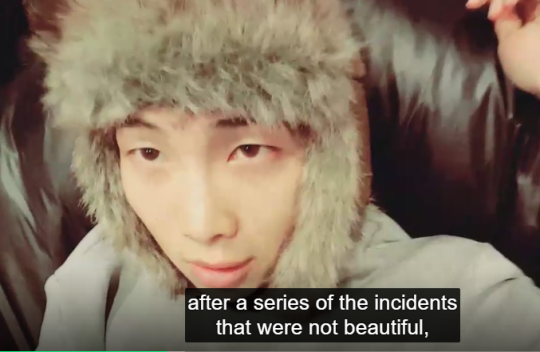
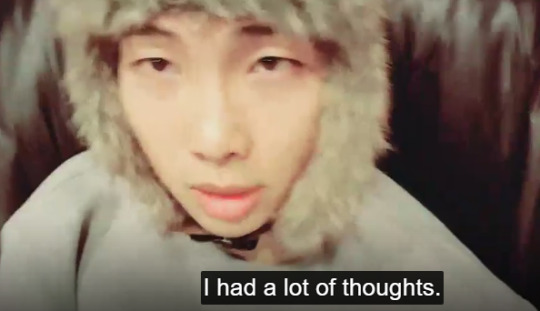

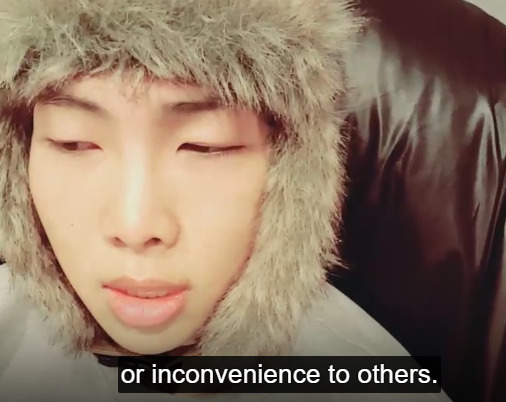

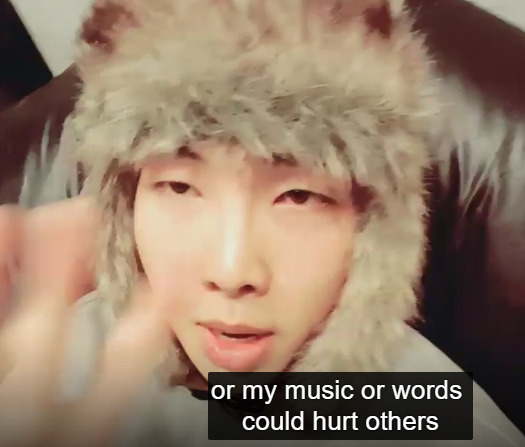
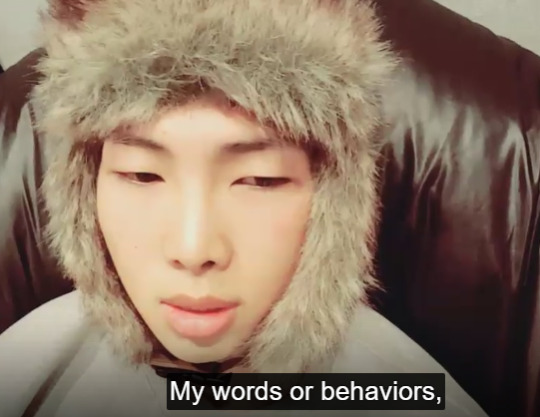

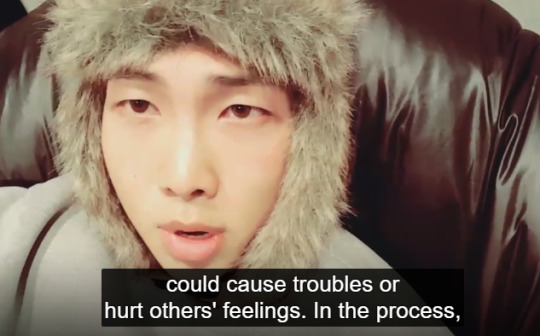
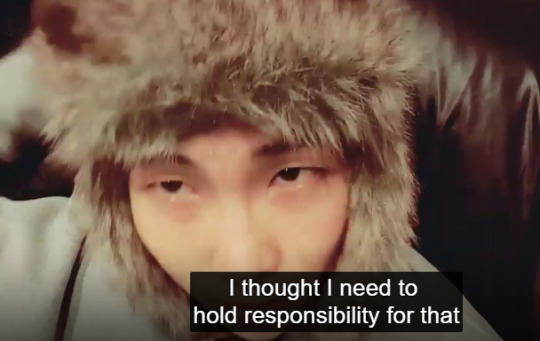
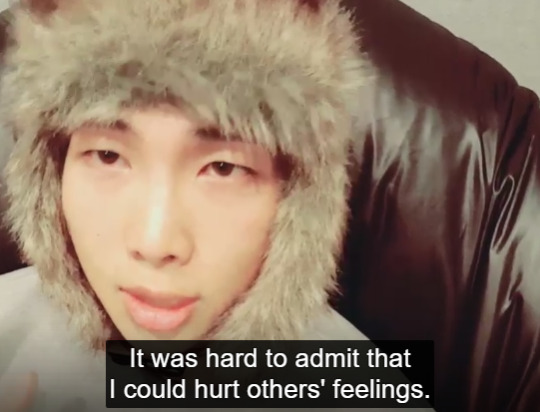
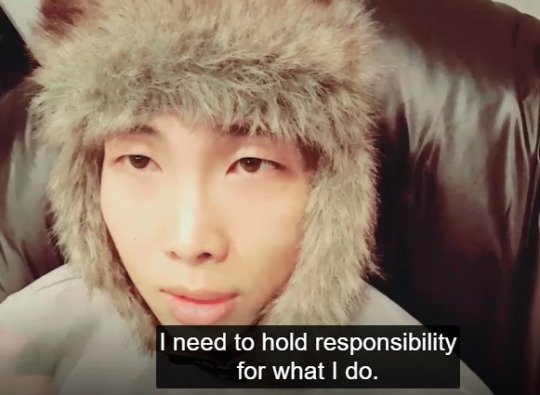

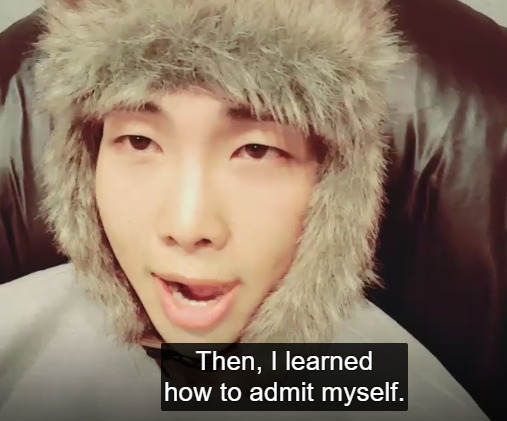
Overall I am saying that Namjoon isnt an idol who made the best decisions in his life but he definitely should not be viewed as someone who is evil but at the same time I don’t view him as someone who is a wOKE KING!212 Mistakes are mistakes but its how you own up to them which ultimately says how you are as a person.
He is human after all and instead of degrading him I simply just recognized his growth and willingness to learn and that was enough for me.
#bts#bangtan boys#bangtan#kpop#rap monster#bts problematic#rap monster problematic#bts rant#namjoon rant#rap monster rant#namjoon#hoseok#seokjin#jin#suga#j-hope#taehyung#v#jimin#jungkook#yoongi#bts thread#btsxlami#problematickpop
287 notes
·
View notes
Text
Death Grips and Jaques Attali’s Networks of Musical Production
In her essay “Extreme Noise Terror: Punk Rock and the Aesthetics of Badness,” Angela Rodel argues that extreme subgenres of punk, along with 19th century art music use an aesthetic of extreme noise and egotistical, non-communicatory strategies of composition to escape from what she describes as a “network of repetition” in which “music becomes a weapon of disguised violence, used to silence people through the illusion of choice and the banalization of any oppositional messages.” Using framework from Pierre Bourdieu, she describes how punk music, although often claiming to be musical resistance to social power structures, can become co-opted by the industry it claims to be rebelling against and used to trivialize genuinely subversive music. She then compares Bourdieu’s model to that of Jaques Attali, which describes four “networks” of musical production. First, that of “ritual,” the power of music itself, “representation,” where music is passively consumed by an audience, “repetition,” in which music becomes a commercial product designed for exchange and profit, and “composition,” where music is played “for self-enjoyment alone” and cannot be absorbed “into even a symbolic economy” due to its private and non-commercial nature. Attali’s model differs from Bourdieu’s in its inclusion of this final phase, which Rodel characterizes as being the only way to escape from the cycle of “repetition” (Derno, 2004).
Rodel’s essay was published in 2004 as part of the book Bad Music: The Music We Love To Hate and although it is sparse in terms of specific musical examples, the musical context she is specifically describing is that of “punk,” which in the context of her essay, she defines as “a general aggregate of musical styles and their associated subcultural ideologies that have developed over the past twenty-five years.” Since punk’s influence was so widespread and arguably transcended the genre of punk itself, I take this to include a wide variety of non-punk genres like ambient, electronic harsh noise, and a wide variety of internet based niches that didn’t exist at the time of the publication of Rodel’s essay that operate using similar strategies of “self-alienation.” I also believe that although she describes the four phases as “potentially overlapping,” I don’t think she was able to take account just how much it is possible for the four phases to overlap as they do now thanks to platforms like BandCamp and SoundCloud. While there is certainly no shortage of clearly “self-alienating” DIY noise music out there that clearly exists within or at least approaches Attali’s phase of “composition,” I believe it would be more interesting to look at an example where more of these phases overlap, and for this post I want to discuss how the ethos of Sacramento band Death Grips subversively combines the seemingly contradictory phases of “composition” and “repetition” (Derno, 2004).
Comprised of vocalist MC Ride, drummer Zach Hill, and audio designer Flatlander, Death Grips first made waves with their 2011 mixtape Exmilitary, which they released for free without a label. While it dealt in dark topics such as drug abuse, voyeurism, and violence, and existed on the fringes of any kind of genre classification, it was very popular upon its release and eventually landed them a major label record deal (Diver, 2012). Although it was released for free and its antisocial themes would seem to indicate that this album was purely within Attali’s phase of composition, its prominent use of easily recognizable samples from artists ranging from Pink Floyd to Link Wray to Black Flag suggests a little of the phase of repetition, albeit the repetition of other artists’ music rather than their own. It could be argued, however, that due to the album being released for free, it can be inferred that the samples were probably not legally cleared and thus not commodities in any kind of economical sense. However, it is hard to argue with the symbolic capital of invoking an artist like Syd Barrett or using a quote from Charles Manson to open the album to a band who have claimed that they are “essentially outsider music” (Diver, 2012).
They would more interestingly flirt with the phase of repetition after signing a deal with Epic and releasing their debut full-length album The Money Store, the title of which already demonstrated a level of self-awareness about their alleged “selling out.” “We spoke to many labels,” said Hill, “and we’ve talked amongst ourselves about how no representation is better than the wrong representation. But Epic were clear at the very beginning that they would let us handle ourselves. They went into this deal already aware of the ideology that we’re driven by, and they’ve worked to help the team move forward” (Diver, 2012). Thematically, the album explored their relationship with internet culture and the commodification of their art, especially on tracks like “Hacker” (”The tables flipped now we got all the coconuts bitch”) and “I’ve Seen Footage” (”Desensitized by the mass amounts of shit/I’ve seen it, I’ve been it”) (Genius, 2019c; Genius, 2019b). It would not be long, however, before they engaged in the self-alienation of the phase of composition by leaking their third album No Love Deep Web, causing them to be dropped by their record label. The opening track “Come Up and Get Me” could be read as an affirmation of this self-alienation: “When the world comes knocking/Fuck this world, fuck this body” (Genius, 2019a). The video for “No Love” saw them interfering with the repetition of their own music, abruptly interrupting the audio and pausing the visuals to flash text on the screen that read “1000%!! I USED TO GIVE A FUCK” while harsh digital noise played (Death Grips, 2014).
The rest of Death Grips’ albums were released on their own label, Thirdworlds (Stevens, 2013). They would release Government Plates in 2013 and the double album The Powers that B in 2015 before announcing their breakup and cancelling a string of high-profile tour dates with the likes of Soundgarden and Nine Inch Nails (Adams, 2014). The decision seemed rushed (the announcement was written on a napkin and then posted to instagram) and the reasons for the breakup were unclear, so many fans assumed it was a hoax. Due to the band’s dislike of interviews, it was never clear whether this was some self-destructive posturing on their part meant to create interest in an upcoming album or whether they had actually planned to stay broken up, but in 2016 their fifth studio album, Bottomless Pit was announced and the band published an “Interview” that compellingly overlapped Attali’s phases of composition and repetition in a number of ways. The interview was in the form of a video uploaded to their Youtube channel. The first few minutes show the band performing for “Tuesdays with Matthew” host Matthew Hoffman while non-diegetic instrumental music by the band plays over the performance (Geslani, 2016). Hoffman goes on to interview each member of the band, but none of the diegetic audio from the interview is included and the video essentially becomes an extended music video for music that would later be released as the Interview 2016 EP (Death Grips, 2016). While this could be read as an affirmation of their dislike of interviews and, by extension, the media machine that demands them, it is worth noting that they are also engaging in self-alienation by blocking out the diegetic music they are playing in the video. What is also interesting is that they are also in the phase of repetition because they are using this subversion of the interview as promotional material for their upcoming album. This seems to be a self-aware decision, though, as lyrics from “Trash” the seventh track on Bottomless Pit seem to indicate (”We upload trash/face down, trash begets trash”) (Genius, 2019d).
The theoretical framework Rodel presents in her essay is especially interesting in the context of a group like Death Grips due to their self-awareness and individualism, and the aesthetic strategies she presents have grown increasingly multifaceted and overlap in ways that have only become more interesting in the internet age. In my own work, some themes I hope to explore are alienation and self-alienation as a form of escapism in the context of music and technology. For this reason I think I will be writing my critical analysis about the section of Rodel’s essay where Attali’s 4 phases of musical production are described and she explains how punk ideology and musical production in Attali’s network of composition can lead the way to a kind of liberation through aesthetic self-alienation (Derno, 2004).
References:
ADAMS, G. (2014). Nine Inch Nails and Soundgarden replace Death Grips on Tour with Oneohtrix Point Never, Dillinger Escape Plan, and Cold Cave. [Online] Available at: http://exclaim.ca/music/article/nine_inch_nails_soundgarden_replace_death_grips_on_summer_tour_with_oneohtrix_point_never_dillinger_escape_plan_cold_cave [Accessed 23 November 2019]
DEATH GRIPS (2014). Death Grips - No Love (Official Video). [Online Video] 13th February. Available from: https://www.youtube.com/watch?v=2MHhLDCJ57E. [Accessed 23 November 2019].
DEATH GRIPS (2016). Death Grips Interview 2016. [Online Video] 13th March. Available from: https://www.youtube.com/watch?v=LtW7Qz0a3o0. [Accessed 23 November 2019].
GENIUS (2019a). Death Grips - Come Up and Get Me Lyrics. [Online] Available at: https://genius.com/Death-grips-come-up-and-get-me-lyrics [Accessed 23 November 2019]
GENIUS (2019b). Death Grips - Hacker Lyrics. [Online] Available at: https://genius.com/Death-grips-hacker-lyrics [Accessed 23 November 2019]
GENIUS (2019c). Death Grips - I’ve Seen Footage Lyrics. [Online] Available at: https://genius.com/Death-grips-ive-seen-footage-lyrics [Accessed 23 November 2019]
GENIUS (2019d). Death Grips - Trash Lyrics. [Online] Available at: https://genius.com/Death-grips-trash-lyrics [Accessed 23 November 2019]
DERNO, M. & WASHBURNE, C.J. (eds.) (2004) Bad Music: The Music We Love To Hate. London: Routledge.
DIVER, M. (2012). Suspicious Minds - The Resolute Mission of Death Grips. [Online] Available at: https://www.clashmusic.com/features/suspicious-minds-the-resolute-mission-of-death-grips [Accessed 23 November 2019]
GESLANI, M. (2016). Death Grips release bizarre video dubbed “Interview 2016″ - watch. [Online] Available at: https://consequenceofsound.net/2016/03/death-grips-release-bizarre-video-dubbed-interview-2016-watch/ [Accessed 23 November 2019]
STEVENS, J. (2013). Death Grips to release New Album under Record Label Thirdworlds. [Online] Available at: https://www.nme.com/news/music/death-grips-31-1260274#:~:targetText=Death%20Grips%20have%20announced%20that,dropped%20in%20November%20(2012). [Accessed 23 November 2019]
1 note
·
View note
Photo
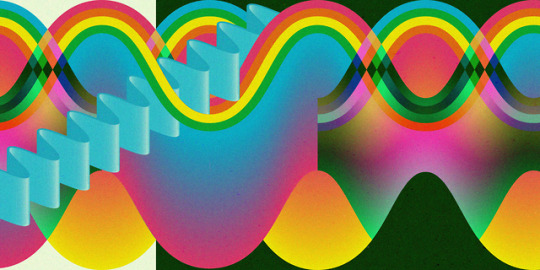
Welcome to the Singles Era | HumanHuman
The single: it’s a staple format of the music industry and in recent years it has dominated our field of vision. For some, it’s the answer to all ailments. For others, the hit single becomes a haunting spectre to be unceremoniously played at every gig. However, for most, that special single is a game changer - a truly great hit can break an artist, define an era and win over a fan for a lifetime. We’ve noticed that the single is the modern music industry’s current obsession, and we’re asking where has this trend come from and what impact does this have on other areas of the business?
The first part of this discussion will focus on our historical love affair with the single. We’ll be tracing these roots back to the height of our obsession in the mid 20th century, then onto to the rise of the album in the late 60s and early 70s, and then to the subsequent switch in the age of the Internet. By looking back in this way, we might be able to make more sense of why our culture is so utterly fixated on the hit hingle. As Bob Stanley suggests “We have to know where music has come from in order to understand where it’s at and where it could be heading” (Yeah Yeah Yeah: The Story Of Modern Pop).
Bouncing straight off that prophetic quote and into Stanley’ great explanation of pop history, and specifically to a landmark moment he pinpoints - the launch of the first 45 rpm vinyl discs in November 1952 via EMI Records. The first year of the singles era was a sign of things to come as “by the end of 1953 EMI had issued close to three hundred 45 rpm titles.” Most notably, Billboard, one of the longest-running documenters of popular music, kept tabs on this revolution throughout the 1950s by publishing several singles charts, including Best Sellers in Stores, Most Played by Jockeys and Most Played in Jukeboxes. This variety was an indicator that singles were everywhere and by 1958 the Billboard Hot 100 chart was here to stay.
The singles trend then continued well into the following decade, and as one Rate Your Music compiler states:
“The point when album sales overtook 45 rpm single sales didn't occur until 1966 or 1967, roughly at the same the time the Beatles were working on Revolver and Sgt. Pepper's.”
“Voodoo Child” by the legendary Jimi Hendrix spans a heart-stopping fifteen minutes
Prior to that, what all of these influential tracks had in common was their format - the 45 rpm disc - and so artists felt obliged to keep their songs to an industry prescribed three minute mark. Lengthier titles were consequently pushed into the eaves of the LP. A few examples hand-picked by The Telegraph for their list ‘50 Greatest Album Tracks: the hits that never were’ could be Aretha Franklin’s “Ain’t No Way” (1968) at 4:12, Velvet Underground’s “Venus In Furs” (1967) at 5:12, or “Voodoo Child” (1968) by the legendary Jimi Hendrix which spans a heart-stopping fifteen minutes. That’s not to say these tracks weren’t popular, but rather they weren’t able to make an impact by chart standards. However, listeners were already voicing their frustration with the traditional audio options and the industry’s oppressive standardisation. Some argue that the turning point came with Bob Dylan’s memorable “Like A Rolling Stone”, first released in 1965 via Columbia Records. It was an unexpected hit that the label “didn’t have high hopes for [...] since it was six minutes long” (Rolling Stone) and CBS even tried to make the record more “radio-friendly” by spreading it over both sides of a seven-inch vinyl, which did not go down well with Dylan or his fans who demanded the song be played in its entirety on radio and be accommodated for on one side of vinyl (Greil Marcus, Like A Rolling Stone).
From the late 60s onwards consumers began moving further and further away from the single. In 1969, Billboard published a report on this cultural shift which showed that even in the face of changing sales, the label owners were reluctant to let go of the make-more-hits technique that had served them so well over the past few decades.There was clear uncertainty from vintage executives like Decca’s Colin Borland, EMI’s Ken East and Penny Farthing’s Larry Page who points out a sore point for the business: “Singles are far too costly at the moment: but if the whole prices structure for records were changed, then I believe there would be a swing back to singles.” Of course, Page and the other singles advocates had no idea what it would take to trigger such a “swing”. With the wonderful resource of hindsight we can now see that on the other side of the rising album wave waited a digital revolution that would simultaneously shatter the music industry and save the single.
Some suggest that the resurgence of the hit single obsession began with the emergence of the first digital music store iTunes, and some lay blame with the explosion of streaming services, but really it began much earlier with the rise and mass adoption of music piracy. Napster, LimeWire, Pirate Bay… whatever your poison was, it’s safe to say that everyone (especially those pesky millennials) did it. An interesting aspect of this underground movement was that even the groups responsible for leaking hundreds of thousands of tunes still considered the album to be the most valuable. The rest of us, on the other hand, that is the general consumer, seemed to prefer our pirated material in the single form, and there’s a few reasons for this. Firstly, in the early days of the MP3 it could take hours or even days to download a digital LP so spending only a few minutes on your absolute favourite track of the moment does seem much more attractive. Secondly, the advantage of exclusively downloading “hits” meant you could forget about the album filler. And thirdly, the chart toppers were relatively easy to find - a quick search and hey presto! music for your library, without the need to go searching for obscure b-sides or underwhelming bonus tracks. Thankfully, music piracy with it’s symptomatic sub-standard audio files and virus-filled downloads are now a thing of the past, but where technology has progressed, our consumer habits haven’t. The Guardian’s Eamonn Forde spells it out for us:
““In 2003 – before digital made an impact on legitimate sales – a total of 30.8m singles were sold in the UK [...] Fast forward to 2012 and the story is very different. A total of 188.5m singles were sold in the UK last year (of which 99.6% were digital)””
In direct correlation to this album sales came to 100 million in 2012, which was a depressing downturn of a third over the same period. The fact is the decline of the album as a consumer’s go-to choice of format has been a slow and continuing one, and in direct correlation the single has risen to take its place back on the sales throne.
We’ll leave off our adventure through music history with a nod to our relationship with the radio. Think about when you tune into your favourite station: what do you expect to hear? For most, the answer is a string of chart-toppers or only the best songs from their preferred genre(s), and that’s because hit singles are the staple diet of radio. We have been conditioned to expect, hope for and need a selection of Top 40 hits. Our behaviour towards music consumption is something we already linked to radio in our article ‘Is streaming the final destination?’, and so we could argue that our reliance on one of the music industry’s few stabilities - radio - has shaped the way we prioritise singles over albums. What’s more this trend only seems to be on the up.
Over the past year, the big stars of radio have made moves towards streaming. First in February 2015, Zane Lowe left BBC Radio 1 to run Beats1 for Apple Music, a move rumored to help Apple’s streaming service compete directly with Spotify. Then last December, George Ergatoudis left his position as Head of BBC Music to lead Spotify’s in-house music curation and content strategy. This is no coincidence as a year and a half ago, he tweeted:
“With very few exceptions, albums are edging closer to extinction. Playlists are the future.”— George Ergatoudis on Twitter
And since radio’s format has always been, in essence, the playlist, it’s no surprise to see these music influencers transition into the streaming industry with ease.
Skipping over the temporary trend of cassette mixtapes, the modern version of playlists really grew in popularity with credit to YouTube. In 2011, Forbes already reported music videos to be ranked amongst the highest of YouTube views and currently the Top 20 most viewed videos on the site are all music videos. The preference for singles on YouTube can also be mirrored with the growth of Majestic Casual, La Belle Musique and other music channels. These channels upload singles and often gain significantly more views than the original artist upload. Just take a look at Kygo’s “I See Fire” remix, which has 57+ millions plays on La Belle Musique’s channel compared to 42.4 million on his own SoundCloud. These channels have soon progressed to become serious contenders in the music industry, with Majestic Casual sitting in as a Resident DJ for Beats1 and La Belle Musique hosting their own one day music festival in Malta. It’s a career projection most musicians aspire to have in their lifetime, let alone within four years.
This trend brings a second wave in the music-tech industry that points towards “playlist startups.” Some have already been acquired, like Soundwave (by Spotify in January 2016) and Songza (by Google Play in July 2014). Other notable curators are 22tracks, a site with the sole purpose of promoting singles; ToneDen.io, which helps artists build their audience by allowing listeners to download singles in exchange for social follows; 8tracks, a playlist-centric site which has 8 million active users per month; and Playlists.net just released a new app called “Playlist a Day” which requires Spotify. The list expands even further when you include influencers on platforms like SoundCloud. For example, HumanHuman user Discobelle has a whopping 1.02 million followers on SoundCloud and Hillydilly has 11K followers, the latter of which recently joined the streaming game by releasing their own app, which has seen 5-10K installs on Google Play alone.
Variety in music curation appears to be most significant difference between the radio and streaming industries. Streaming requires a more expansive knowledge of music that caters beyond the Top 40s. Google Play is known for giving the “Susan Boyle” test, where curation applicants must create a playlist that a Susan Boyle fan will love. Offering a streaming service isn’t just about dishing out hits - it goes back to catering to individuals and retaining their attention.
What’s more, some of these playlisters are evolving into celebrities, much like household names Zane Lowe and Annie Mac. One newcomer to the limelight is Connor Franta, co-founder of Heardwell, a six-month old music label in Los Angeles. Recently recruited to join the The Recording Academy, this YouTuber has over 5.2 million subscribers, his reach is higher than most musicians in the business. It’s becoming more apparent that tastemakers in streaming and radio already influence the music industry more than the musicians themselves.
So, what does this unwavering focus on singles mean for the future of albums and their artists?
As George Ergatoudis said “...at a mass market level [the album] is already small and going to stay very small”. Groundbreaking numbers are more likely to only follow names of global powerhouses like Adele and Taylor Swift. It’s also worth noting that even way back before streaming took hold, iTunes counted how many times a song got played, not how many times an album gets played through. There’s no doubt that as digital sales continue to grow, the desire to play an album as a whole piece of work will decline.
A common counter argument to the lost album experience is the rise of vinyl sales. Since 2009, vinyl purchases have risen by 260% and the few start-ups who are in the business of distributing records have developed a solid following. There’s Vinyl Me, Please, a company that believes an album must be enjoyed as a complete work of art; vnyl, a subscription-based startup in the USA that sends you a new record each month; and Turntable Kitchen, which pairs food recipes and vinyls in a monthly subscription service. And unlike digital, there’s no way to track how many times these vinyls get played or if vinyls are just used for display. In the radio world, album supporters are even rarer. One San Franciscan radio show called “Deep Listening” from BFF.fm goes against the traditional “singles format” by playing music from same artist, band, album or theme for sixty minutes. However, it’s unlikely that the music industry will see a huge growth for this type of programme. Ultimately, the art of listening to an album in full is a niche market.
With the rise of playlists and compilation albums, it’s no doubt that singles will define an artist's career well before their debut album does. Technically, YouTube’s Rebecca Black foreshadowed this pattern of “one hit wonders” within streaming, but there are plenty more examples within the music industry. Thanks to tweets from celebrities like Hayley Williams from Paramore and Jessie Ware, obscure artist Ryn Weaver skyrocketed away from anonymity with her song “Octahate.” Alessia Cara’s “Here” peaked at #1 for American Billboard charts, and she was also longlisted for BBC’s Sound of 2016. Then there’s Rory Fresco, an unknown artist who has over 1 million plays on his song “LOWKEY” mostly because SoundCloud’s algorithm put his track after Kanye West’s new song “Real Friends.”
Another example is Gallant whose song “Weight in Gold” has been remixed enough times to be considered an album in itself and his SoundCloud remix playlist has well over 2 million plays. This single propelled Gallant in stardom and he has since gone on to tour with critically acclaimed Sufjan Stevens, and therefore opening up his music to a wildly different crowd than listeners of the “Weight in Gold” remixes. What this shows is by streaming singles new artists can achieve greater exposure and a more targeted audience. The downside is that it also means stretching artists thinly across multiple channels. Music acts may have to get their songs on SoundCloud, Spotify, Apple Music and Google Play to reach the audience they could get from one play on radio. In America alone, radio reach was 245 million in 2015. As for streaming, the numbers are on a global scale: SoundCloud has 250 million, Spotify has 75 million and Pandora has 81.5 million. As streaming services and music apps grow, along with better data plans for mobile, listeners will find ways to listen to singles as they please. This points towards a rise in playlists, a decline in listening to albums as a whole and even a higher value in music curation for radio and streaming.
If we look back at what we’ve learned through this journey so far, there are a few factors that come into play for the rise of the single: cost, format and culture. What has made the hit single so successful today is something of a perfect storm. With the rise in streaming services and free downloads the price of music has been drastically reduced, and for many it’s now seen as a commodity, whereas the full album is treated more as a luxury. This cost-cutting trend is also tied directly into the way we access music. As previously suggested, listening to music as part of the physical experience is now contained to a niche market with the majority of us belonging to a digital community of passive listeners. Where there was once a format war, there is now a streaming war with everyone from Spotify to Apple Music to SoundCloud to Bandcamp to Tidal to Deezer and many more all vying for our attention. The digitalization of the single isn’t solely a business issue, because it also facilitated a sharing culture, where making a connection with an artist’s latest release was no longer a solitary experience stopping at your front door, but a world-wide communal one. While all of this may make it more difficult for an artist set a place on the charts, it also widens the landscape for newer musicians to be heard. On the surface, the current business of making hits may seem like an over-congested, competitive atmosphere, but there are plenty of theorists who imply that competition is a sign of health, bringing about diversity, quality and growth. In other words: welcome to the single’s era and make yourselves comfortable because we may be here for a while.
Illustrations by Slip On The Rock
https://humanhuman.com/articles/welcome-to-the-singles-era
0 notes
Text
TOP American Rapper And Grammy Norminee Nipsey Hussle, Shot Dead Outside His Store In LA
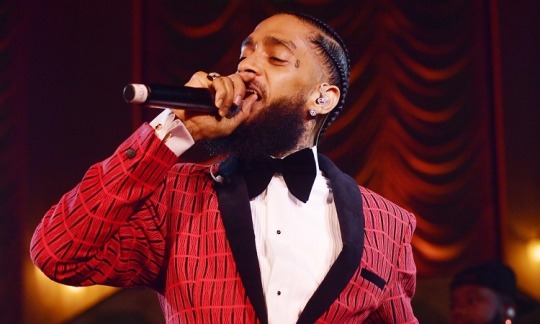
Top American Rapper And Grammy Norminee Nipsey Hussle, Shot Dead Outside His Store In LA. Mayor says city is ‘hurt deeply each time a young life is lost to senseless gun violence’, as Kendrick Lamar, Rihanna and LeBron James pay tribute to 33-year-old Ben Beaumont-Thomas @ben_bt Mon 1 Apr 2019 09.51 BSTFirst published on Mon 1 Apr 2019 05.34 BST Shares 861 Play Video 0:59 Fans pay tribute after rapper Nipsey Hussle killed in LA shooting - video The Grammy-nominated rapper and community activist Nipsey Hussle has been shot dead outside his Los Angeles clothing store, aged 33. Three men were shot on Sunday outside Marathon Clothing, and one of them was later declared dead in hospital, said police, without revealing the identity of the victim.
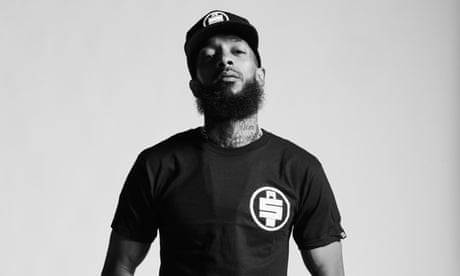
Nipsey Hussle: a hip-hop samaritan who lifted up Los Angeles
The LA Times and NBC quoted police sources as saying the victim was Hussle. The city’s mayor, Eric Garcetti tweeted: “Our hearts are with the loved ones of Nipsey Hussle and everyone touched by this awful tragedy. LA is hurt deeply each time a young life is lost to senseless gun violence. My Crisis Response Team is assisting the families coping with shock and grief.” Police said the other two men were in a stable condition. The gunman fled, and no arrests have been made. “At this point, we’re not even sure as to whether he walked up, rode a bicycle or drove up in a car,” said LA police lieutenant Chris Ramirez. Just hours before his death, Hussle tweeted: “Having strong enemies is a blessing.” Major US stars have paid tribute. Rihanna tweeted: “This doesn’t make any sense! My spirit is shaken by this! Dear God may His spirit Rest In Peace and May You grant divine comfort to all his loved ones!” Drake wrote: “You were having the best run … you were a real one to your people and to the rest of us.” During a concert in Buenos Aires, Kendrick Lamar, who also hails from south LA and had collaborated with Hussle, described him as “our brother, our warrior, our soldier”, and led a moment of silence among the crowd. Hussle had recently recorded with DJ Khaled, and had posted footage from a music video they were making together. Khaled wrote on Instagram that Hussle was “a great man … an inspiration to the whole world”. J Cole, Meek Mill, Vince Staples, and Chance the Rapper were among the other rappers paying tribute. Hussle was a supporter of the LA Lakers basketball team, who posted a tribute online reading: “Artist. Activist. Angeleno. LA mourns the loss of one of our own, Nipsey Hussle.”

FacebookTwitterPinterest Police outside The Marathon clothing store. Photograph: Mark Ralston/AFP/Getty Images The star Lakers player LeBron James wrote on Instagram: “Just spoke with you the other day on text bro! Telling you how proud I was of you and how I was gone get you to more Laker games next season. Been a stand up dude from day 1. May you rest in paradise … this one hurts big time!” Another NBA star, Golden State Warriors player Stephen Curry, wrote: “Just got to know you! Rest in paradise.” Hussle was celebrated for his gritty, socially conscious lyricism, and was nominated for best rap album at this year’s Grammy awards. Born Ermias Davidson Asghedom in south Los Angeles in 1985 to an Eritrean father and American mother, he was a member of the Crips gang Rollin 60s as a young man. “It was like living in a war zone, where people die on these blocks and everybody is a little bit immune to it,” he told the LA Times in 2018 of his time with the gang. “I guess they call it post-traumatic stress, when you have people that have been at war for such a long time. I think LA suffers from that because it’s not normal yet we embrace it like it is after a while.” His rap career began in the mid-2000s, making early collaborations with Drake and Snoop Dogg and getting signed to Epic Records. The major label deal was an unhappy one and led to an album being indefinitely shelved, and he didn’t release his debut album, Victory Lap, until 2018. It reached No 4 in the US charts, and features collaborations with Kendrick Lamar, Diddy and YG. Another YG collaboration, FDT, became perhaps his most famous track: a withering attack on the US president with the chorus, “Fuck Donald Trump.” He also released a series of acclaimed mixtapes, including The Marathon (2010) and Crenshaw (2013). The 2014 mixtape Mailbox Money was available free online, but physical copies cost $1,000 each. Hussle invested in community projects in Los Angeles, including a co-working space called Vector90 that hosts entrepreneurs in Crenshaw. It includes a programme called Too Big to Fail, designed to help local people train in science, technology, engineering and maths. Hussle described it as a “bridge between Silicon Valley and the inner city” and had intended to create a national network of centres. Hussle was also working on Destination Crenshaw, a 1.3-mile open air museum in the Crenshaw district, featuring free open-air art installations. American footballer and activist Colin Kaepernick paid tribute to Hussle’s community work, writing: “This is so painful! Nipsey Hussle was doing great work for the people. Keep his legacy alive by carrying on his work!” • Associated Press contributed to this report. (TheGuardian) Read the full article
#Entertainment#Music#news#NipseyHussleAmericanRapper#NipseyHussleshotdeadinLA#rappershotdeadinamerica
1 note
·
View note
Text
Lil Yachty Net Worth in 2018, His Girlfriend, Facts.

Lil Yachty is among the new breed of modern rappers. He is one of the most loved rappers in the US and around the world. In this guide, you will learn more about Lil Yachty’s life with a focus on his net worth: how much he is worth, and how he earns it. Sit back, relax, and read on.
What is Lil Yachty’s net worth in 2018?
Lil Yachty has made quite a fortune from his music career. As it stands, his net worth is approximated to be 12.5 million dollars. medianet_width = "600"; medianet_height = "250"; medianet_crid = "442568836"; medianet_versionId = "3111299"; His road to fame started in 2015 when is record One Night was used as a soundtrack for an internet vide video. He has a unique and uncommon musical style because he uses samples from Charlie Brown, Mario Bros, as well as sounds from Super Nintendo and Pixar films scenes. (adsbygoogle = window.adsbygoogle || ).push({}); Lil Yachty describes his style of music as a bubblegum trap. His first mixtape titled “Lil Boat” was released in March 2016 and he was approached by several record labels several months later including Motown records, Quality Control Music and Capitol Records. In April the year 2016, he collaborated with the rapper DRAM to release a song titled Broccoli. The song secured the 5th spot at the Billboard Hot 100 chart.

In the year 2017, he released his first debut album called Teenage Emotions. The album features big stars such as Evander Griiim, Migos, Stefflon Don, Grace, and Diplo. In addition to that, Yachty has done a couple of modeling gigs and he debuted at Kanye West’s Season 3 fashion line which was hosted at the Madison Square Garden in 2016.
Lil Yachty Net worth
That is not all, in 2017, Yachty also appeared on a TV commercial for sprite alongside LeBron James. Soon after, he was named the face o UrbanOutfitters and Nautica collections. Yachty was arrested in 2015 at Palm Beach Gardens because of credit card fraud. However, he was later released after paying $11k as bail.
Lil Yachty’s net worth over the years
2018 12.5 million 2017 11 million 2016 7 million Where was Lil Yachty born and how old is he? Lil Yachty was born on 23rd August 1997 in Atlanta, Georgia. His full name is Miles Parks McCollum
Rapper Lil Yachty Is Dating a Girlfriend Megan Denise(Instagram Model).
Lil Yachty is in a relationship with his girlfriend, Megan Denise, an Instagram model. The couple started dating in 2017 but are not married yet. Megan has a sexy body and many tattoos. Yachty seems to be happy in his relationship. Before Megan, the rapper was dating an India woman who was also an Instagram supermodel.
Does Lil Yachty have any siblings? Sisters, brothers or kids?
The rapper is very close to his family. He is especially very close to his mother whom people have nicknamed Momma Boat. His father is a professional photographer. He bought a big mansion for his parents in the year 2017.
Where does Lil Yachty live and does he have a crib?
Yachty lives in New York. However, there are no photos of his crib yet.
Does he own any car?
The rapper owns several cars including two Ferraris. He is in love with Ferrari. Experts expect the price of his old Ferrari to rise shortly.
Upcoming shows and tour dates
To know more about Lil Yachty’s upcoming shows and events, check out his official website. You will also get information about the location of the concerts and tours for the rapper.
Lil Yachty’s Merch
Yachty is a serious businessman: he sells jackets, hats, hoodies, and other materials on his official online website. If you wish to purchase his sunglasses, you can get them on Amazon. What are some of his best records? Yachty has done some hit singles that have sold millions of copies in the US and around the world. This American Rapper has also collaborated with some big artists such as Migos. Here is a list of some of his greatest records: Ice Tray No Hook Wanna Be Us 1 Night Peek A Boo Dirty Mouth Minnesota Forever Young On Me Better featuring Stefflon Don Did Yachty attend any school: college? Yachty went to Alabama State University college. However, he left school to focus on his music career.
Is he active on social media?
Like many new age rappers, Yachty has quite a large following on social media. On Facebook, he has around 530k followers, while on Instagram he boasts of 4.7 million followers. His YouTube channel has 3300 subscribers, his Twitter account of 3.35 million followers, and none on Google Plus. He is also active on Snapchat, using the handle @lilyachty. Notably, you can learn more about the rapper on his official website, or just visit his Wikipedia page. Wiki bio for Lil Yachty Full name Miles Parks McCollum Place of Birth Atlanta, Georgia Date of Birth August 23, 1997 Age 21 Girlfriend Megan Denise Profession Rapper, Model Net worth $12.5 million dollars Eye color Dark Brown Hair color Naturally black (Red or Pink) Sexual Orientation Straight Height 179cm Weight 73Kgs Sign of the Zodiac Virgo What You Need to know about Lil Yachty He has two alter egos: Lil Boat and Darnell Boat Cigarettes, drugs, and alcohol: he does not use any of these things. In fact, he has never drank alcohol in his life, and this is extremely commendable. He used to work at McDonald’s, but he was fired before cropped in. He used to report to work quite late. What are some of his popular and favorite quotes? I wish there was a way through which one could filter hate out of the internet as well as opinions I do not love spending money on women. However, I purchase a Range Rover and a new house for my mother, and it feels so nice to say that. Summary Lil Yachty seems to be a promising rapper and has a lot of potential of becoming the best rapper in the hip-hop world. Notably, he is disciplined and very focused on his music career. For more information about this amazing start, check out his Wikipedia and official website. Trending. Cheap Celebrities Who Are Terrible Tippers Rich Celebrities Who Live Humble Lives Celebrities Who Are Incredibly Generous Tippers. No 8 might surprise you. Best Animal Shows that You will Love. Celebrities Who Drive Most Expensive Cars In The World Read the full article
0 notes